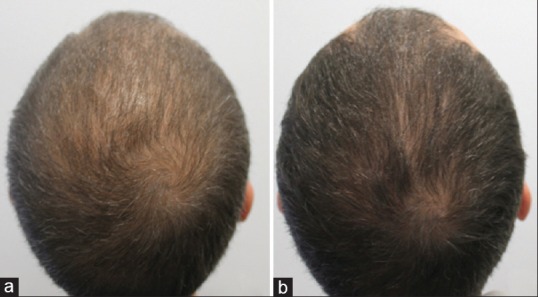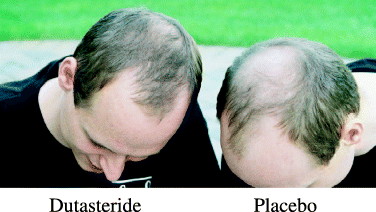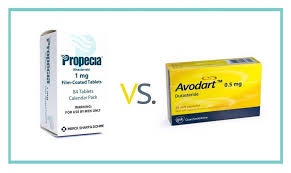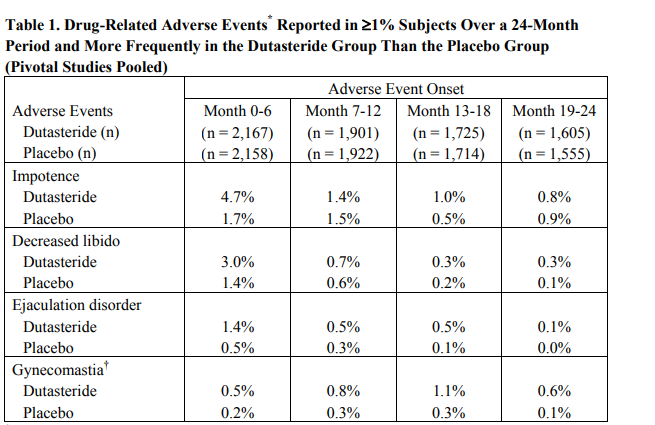Last Updated on July 16, 2023 by Robert Price
Many men looking to supercharge their hair loss treatment programs turn to dutasteride. They do this even knowing that sterility is a possible side effect!
The risks are real, but the benefits are enticing. I’m talking about hair — as thick and luscious as it was in your high school yearbook photo.
You’re conflicted, you’re torn, and perhaps you’re even losing your religion as a result of your hair loss. But bear with me.
As I state in the about section of this website, I’m a hair loss researcher and consumer advocate with thousands of hours of experience in the field. My aim is to provide you with all the information you need to know about dutasteride, a powerful yet potentially dangerous drug.
In this detailed but reader-friendly post, I will:
- Explain why dutasteride is generally believed to work better than finasteride, the most popular hair loss drug on the market as of 2021.
- Talk about the main reason why some hair loss experts are hesitant to prescribe dutasteride to their patients.
- Discuss the risks of using dutasteride, including the possibility of sexual side effects.
- Help you determine if it’s worth the risk and an appropriate treatment for you.
- Reveal the celebrity who took the drug for 10 years and the reason he stopped using it.
- Talk about a promising new vehicle for the medication, the harmful substance it may help you kick, and much more.
Now, before you consider using dutasteride for hair loss, here are 18 quick and easy-to-digest facts you should know:
1. Dutasteride Suppresses 90+% of DHT
And as you probably know, DHT is the hormone that essentially causes hair loss in men (and some women) who are sensitive to its effects. Finasteride, the #1 hair loss treatment option at this time per the industry’s top doctors and organizations, only blocks around 70% of DHT.
Comparatively, in a study with 399 patients, dutasteride was found to block DHT levels by 98.4%! Unlike finasteride, dutasteride is a legit DHT blocker (1).
2. Likely Works Better Than Finasteride
So dutasteride is a more powerful medication, without question, and while it can’t be proven that more DHT suppression leads to better results, most physicians will acknowledge, at least, that dutasteride MAY lead to better results than finasteride in terms of combating hair loss.
Moreover, a 24-week, 2006 study with 416 participants, comparing the effectiveness of dutasteride vs. finasteride, found that dutasteride was the superior option, as it produced higher hair counts in the targeted areas (2).
3. Injections Show Promise
In a 2017 dutasteride study, researchers tested the effectiveness of dutasteride mesotherapy (injections) for hair loss. The study included only 6 participants, each of whom was given 3 rounds of dutasteride mesotherapy, first at the beginning of the study, then after 3 and 6 months.
Increases in hair density and diameter were observed in all patients. And perhaps more significantly, no adverse effects were reported. Unlike oral dutasteride, which effectively blocks DHT in the serum, the researchers found that mesotherapy with dutasteride did NOT reduce serum DHT levels.

One patient’s results at baseline and after 6 months of dutasteride mesotherapy.
As of 2020, very few hair-loss specialists offer dutasteride mesotherapy, but hopefully it’s a treamtent that is evaluated further in the near future. The fact that mesotherapy may treat hair loss with less side effects than the oral medication is certainly a positive development.
4. It’s Not FDA-Approved in the US
Unlike finasteride, dutasteride has not been subjected to extensive, successful, long-term studies that demonstrate its efficacy or safety as a hair loss medication. Accordingly, it is not approved by the FDA to treat pattern hair loss, AKA androgenic alopecia, at this time.
5. Used for MPB in Japan and South Korea
Dutasteride, however, is approved and prescribed routinely to treat pattern baldness in both Japan and South Korea. This is slightly surprising to me, as Asian men are notoriously less susceptible to balding. Whether this is evidence that it’s an effective AGA treatment or not is debatable.

In a small study conducted on twins, researchers concluded that dutasteride significantly slows the progression of pattern hair loss.
6. Regularly Prescribed “Off-Label”
When a medication is prescribed for a purpose other than its intended use, it’s known as an “off-label” prescription. And while you’re unlikely to obtain a prescription for dutasteride from your US doctor to treat hair loss, you may be able to get the drug via an appointment with a hair-loss specialist/surgeon.
7. It’s Used to Treat BPH (an enlarged prostate) and may Improve Your Urinary Flow
As of now, the medication is primarily used to alleviate the symptoms of BPH, an enlarged prostate, in older men. So as a “bonus,” if you want to call it that, your dutasteride script may help shrink your prostate and help you urinate more efficiently.
By the way, the fact that finasteride is frequently prescribed for this purpose too is one of the top 10 things I hate about Propecia. But I believe in balance with this blog, and I recognize that there are many reasons to give Propecia a chance. Moving on…
8. Generally Well-Tolerated
In an extensive, 2016 review of 5-a reductase inhibitors, where studies dating back to 1990 were examined, researchers concluded that the medications finasteride and dutasteride were both generally well tolerated, although not without risk (3).
9. Many Physicians are Hesitant to Prescribe It for Hair Loss
On his website balding blog, Dr. William Rassman notes sterility as a rare side effect of the drug.
He also expresses his concern that no long-term studies on dutasteride have been conducted on men under 30.
Accordingly, Rassman like many other doctors in the field, prefers to prescribe FDA-approved drugs like finasteride (4).
10. Ashton Kutcher Took it for 10 Years
Alright, this is just kind of an interesting tidbit.
In a discussion with his pal Dax Shepherd, Kutcher stated that he took Avodart, a brand-name version of dutasteride, to combat his hair loss for over 10 years.
He discontinued the medication as he prepared to start a family with his wife and former co-star, Mila Kunis. His hair’s surprisingly still hanging in there, too! Here’s a clip featuring Kutcher discussing his hair loss and Avodart use on Conan:
11. Dutasteride Reduces 5 a1 and 5 a2 Levels
Now, here’s a quick science lesson, in brain-dead simple terms. Two enzymes play a role in DHT production and the development of pattern hair loss, including:
- 5-alpha reductase 1 – This enzyme is located primarily in the skin, including the sebaceous glands and hair follicles.
- 5-alpha reductase 2 – Located near the inner root of the hair follicles on both the head and body, as well as in the genitals and prostate gland.
Finasteride only blocks 5-a reductase 2 levels, whereas dutasteride helps reduce both 5-a 1 and 5-a 2 levels. Researchers noted that dutasteride is over 100 times more potent than finasteride in combating type AR-2 levels, and 3 times more effective at reducing type 1 levels.
Both enzymes are factors in the baldness equation, so the fact that dutasteride blocks both of them is perhaps indicative that it’s a more potent weapon against androgenic alopecia.
12. May Suppress Your Desire to Drink Alcohol
This was another random fact I encountered. In my research, I stumbled upon a study that found that dutasteride reduces the “sedative effects” of alcohol, and that it may suppress your desire to drink. Researchers hypothesized that dutasteride effected neuroactive steroid concentrations, leading to less alcohol abuse overall among the participants in the study (5).
Heavy drinking may expedite baldness, so alcoholics suffering from hair loss may experience multiple benefits from the drug. And I’ll drink to that.
13. Sometimes Prescribed when Finasteride isn’t Effective
Dutasteride is a super-potent hair loss medication. However, since it’s not approved by the FDA and there haven’t been any long-term studies to verify its safety as a hair loss medication, many doctors, including the aforementioned Dr. Rassman above, are hesitant to prescribe it.
But in cases when finasteride is ineffective for a patient, some physicians will recommend dutasteride as an alternative.
Are you super sensitive to androgens with strong MPB genes? If so, finasteride alone may not cut it as a stand-alone treatment, which is where a more powerful medication like dutasteride could potentially come into play.
14. Dutasteride has a longer Half-Life than Finasteride
Dutasteride has a “half life” — that’s the amount of time it takes for a drug’s concentration to be reduced by 50% in the body — of four to five weeks in men under 70. Finasteride, on the other hand, only has a half-life of five to six hours (6).
The real-world effects of this are relatively minimal, as low-dose finasteride — .5 mg taken every other day, for example — has been shown to effectively treat pattern hair loss. But if, for example, you’re planning on starting a family, you’ll likely want/need to discontinue your dutasteride use sooner than you would if you were on plain finasteride.
15. The Risk of Sexual Side Effects is Relatively Low
In a four-year, double-blind study with nearly 5,000 participants, researchers found that sexually adverse events were relatively uncommon. 7.3 percent of participants reported erectile dysfunction. Decreased libido, 4.2%. And ejaculation disturbances were noted in 2.2% of patients. Its side effect profile was similar to finasteride’s — the 5 mg. Variety (7).
Of course, this was a study on 5-a reductase inhibitors and their effectiveness in treating BPH, so many of the participants were older men who were likely more susceptible to erectile dysfunction and related side effects.
I’ve seen other studies that indicate a lower rate of sexual side effects with dutasteride. During FDA trials, researchers found the risk of impotence was actually very low, though early on in the study, 4.7% of Avodart users reported impotence vs. 1.7% of those who used the placebo. By the study’s conclusion, however, the placebo group surprisingly had a slightly higher rate of impotence. Below is a side-effect chart from that double-blinded study, which included over 4,000 participants and lasted for two years.
Comparatively, studies on oral finasteride (1 mg) have demonstrated that only 1-2% of users experience sexual side effects, although those figures don’t take into account a relatively new phenomenon known as the “nocebo” effect.
16. Gynecomastia (Enlarged Breasts) In Males Also Possible
Question: Will dutasteride give you man boobs?
Answer: Probably not.
But in a thorough medical review, researchers noted a greater than 3-fold elevation in risk of gynecomastia among users of finasteride (5 mg) and dutasteride (8). Overall, the risk is still fairly low but something to be aware of, certainly. In a four year dutasteride study with 4,325 participants, gynecomastia was observed in 1.9 percent of dutasteride users vs. 1% of those on the placebo (9).
So, if you notice any tenderness, swelling, discomfort, etc. in the area, be sure to let your doctor know immediately. Symptoms of the condition can take some time to develop. Some patients notice them within a few weeks, but it usually takes a few months. Some have even reported developing the condition after years on the medication.
17. Other Possible Dutasteride Side Effects
Like any medication, dutasteride has a wide variety of potential side effects. Overall, sexual side effects are most common, and we’ve already reviewed those. Other, serious side effects are also possible. Be sure to talk to your doctor immediately if you notice any of any of the following:
- Heart palpitations
- Chest pain or discomfort
- Swelling of the face, feet, fingers or lower legs
- Extreme lethargy
- Irregular breathing or heartbeat
Although it wasn’t listed as a side effect during the initial trials, depression has also been reported in a small percentage of 5-a reductase users.
18. May Cause Birth Defects
Women of child-bearing age are typically advised to stay away from dutasteride, as well as finasteride, due to the risk of birth defects. So as a general rule, keep the woman or women in your life away from your anti-baldness pills.
Conclusion – Dutasteride for Hair Loss: Does it Work?
Dutasteride appears to be a highly effective treatment for hair loss, but it’s not regarded as a first-line option in most cases, primarily due to the lack of long-term research.
My take on it: I don’t particularly like the idea of reducing my DHT levels internally in the first place, so the prospect of blocking the hormone almost entirely makes me very uneasy. I realize DHT is fundamentally a developmental hormone and that most medical professionals assert that it has few if any benefits after puberty. Blocking the hormone all together (almost) though — that’s just a bit too extreme for me.
At the same time, I realize that finasteride doesn’t work for everyone. So, if you’re someone who’s young and dealing with aggressive balding, this could be a treatment worth considering.
If you have a personal experience to share or any thoughts on the subject, I’d love to hear from you.
And since you made it this far, here are a few more, hand-picked articles I think you’ll enjoy:
- A Long, Hard, and Honest Look at Propecia – Is It Worth the Risk?
- Low-Dose Finasteride – Five Things You Should Know Before You Start a .25 or .5 mg Finasteride Regimen
- Finasteride for a Receding Hairline – Will It Work?
- About the Ball Ache – 7 Things You Should Know About Propecia and Testicle Pain
Robert Price is a writer, consumer advocate, and hair loss researcher with thousands of hours of experience in the field. His goal is to keep you out of the hair loss rabbit hole, underworld, or whatever you want to call it. He founded Hair Loss Daily, the unbiased hair loss blog, in 2016. You can learn more about Robert in the my story section of this website.



